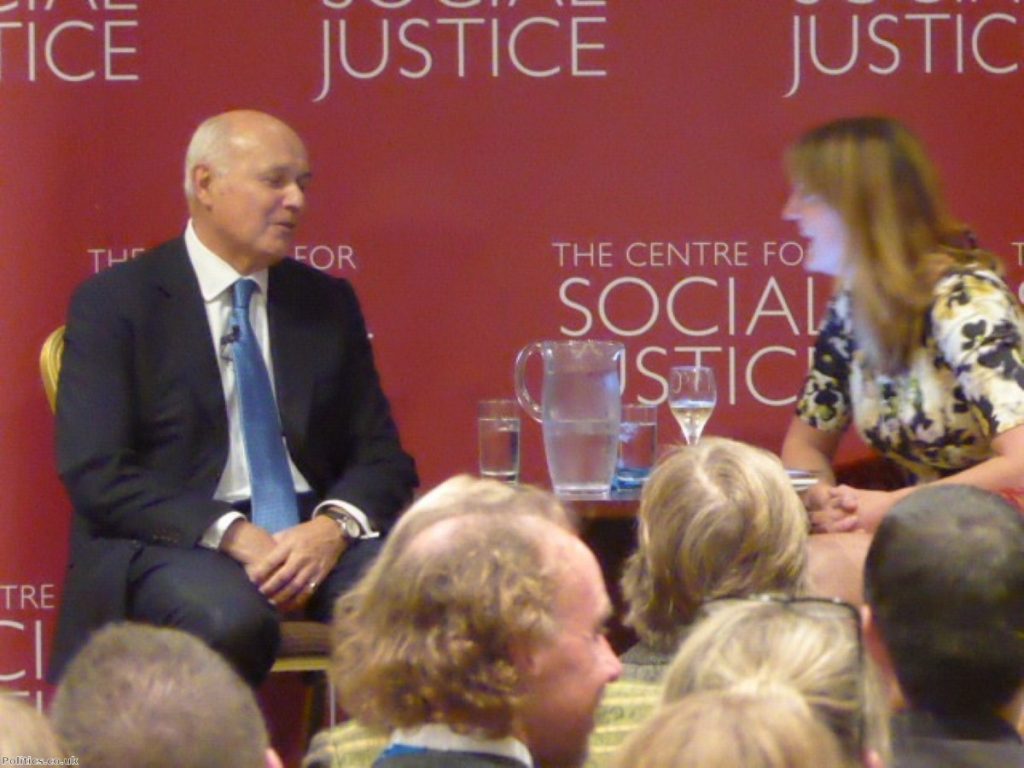Revealed: The true cost of Iain Duncan Smith’s welfare reforms
For the thousands of people who have been hit by Iain Duncan Smith's welfare reforms, the findings of a new report published today will come as little surprise.
The audit, which was carried out by the Labour MP and chairman of the Work and Pensions Select Committee Frank Field, who has been a supporter of some of Duncan Smith's key welfare reforms, examines the extent to which each measure contributes to the government's stated aim of mending 'broken Britain'.
The findings are damning. While it recognises that more people are in work and congratulates the government on reducing the benefit bill, it suggests those successes have come at a high cost to some of society's most vulnerable people. So let's go through the record and see how the government have fared.


Has the government enshrined work as the best route out of poverty?
Remember that soundbite about 'making work pay' which was repeated by ministers over and over again like some kind of Buddhist chant? Well, this report confirms what most people in low-paid work already knew: when you're at the bottom end of the labour market, being employed simply doesn't protect you against poverty. Former claimants may now be in work but many of them are still struggling to make ends meet.
According to Field and co-author Andrew Forsey: "The explanation for the government’s failure to enshrine work as a failsafe means of guarding against poverty is twofold. First, there have been significant increases both in the extent of low-paid work as well as the number of people moving from low benefit income into low-paid jobs and being parked there; second, cuts have been imposed upon benefits and tax credits claimed by this same group of low-paid workers"
So not only is low pay a problem but far from helping people out of poverty, work is actually helping to keep people in it.

Has the government delivered ‘Welfare That Works’?
Universal Credit comes in for some of the harshest criticism in the report with the authors finding that the current benefit system is a more effective incentive to work than Duncan Smith's flagship scheme. "Because of Universal Credit’s higher taper rate for many claimants, the strategy of fixing ‘broken Britain’ by offering lower withdrawal rates than the current system lies in ruins." they say.
They also found that aside from the benefit cap, cuts and restrictions to housing benefit have failed to incentivise work. Lack of affordable homes is obviously a massive contributing factor to the high housing benefit bill, the authors of the report touch on this and call on the government to increase the supply of housing by initiating a national housebuilding programme.
Despite agreeing the government is right to impose conditionality to benefit claims, they highlight how sanctions are now being applied at a scale unknown since the second world war. "Injustices could well be occurring on a scale unknown; unknown as the government does not collect data, and as a consequence we believe that genuine claimants could be at risk of being exposed to destitution," they warn. They also point to the high number of people who resort to food banks after being sanctioned, as an indicator that the sanctions policy needs to be changed.
Has the government succeeded in reforming incapacity and disability benefits?
For many sick and disabled people the work capability assessment – a single test to determine whether a claimant with disabilities is capable of doing some sort of work – is a source of dread. The long delays to the appeal process, which so often follows a decision, mean that the test is often a stressful experience. But today's report suggests that the system is also proving frustrating to the government, with a larger sum being spent on incapacity benefits than it budgeted for.
Field and Forsey are critical of the government's substitute for Disability Living Allowance, Personal independence Payment (PIP). "All of the government’s targets for Personal Independence Payment – for claimants to receive greater support, and on savings and numbers claiming – have been missed, while those applying to claim the benefit were often left waiting for months and months before finding out whether their claim was successful," they say.
A measure of success?
One area where the report suggests the government has been successful is in making life on benefits harder than for those in work. It found that the changes have widened the overall gap between what somebody can earn in work compared to those on benefits, but again this comes at a cost. "This measure [to uprate working-age benefits in line with CPI and then impose a one per cent cap on the uprating of benefits each year], yielded ginormous savings but, in doing so, compounded the differential impact of inflation experienced by the poorest households. Not surprisingly, therefore, this policy was forecast to have made 200,000 more children poor," they say.
That's a very strange measure of success, isn't it? It's basically saying the government has succeeded in making life more miserable for some of society's most vulnerable people.
If the government's war on welfare is really about giving claimants a step up rather than just cutting off support, this report makes it clear it still has a very long way to go.











